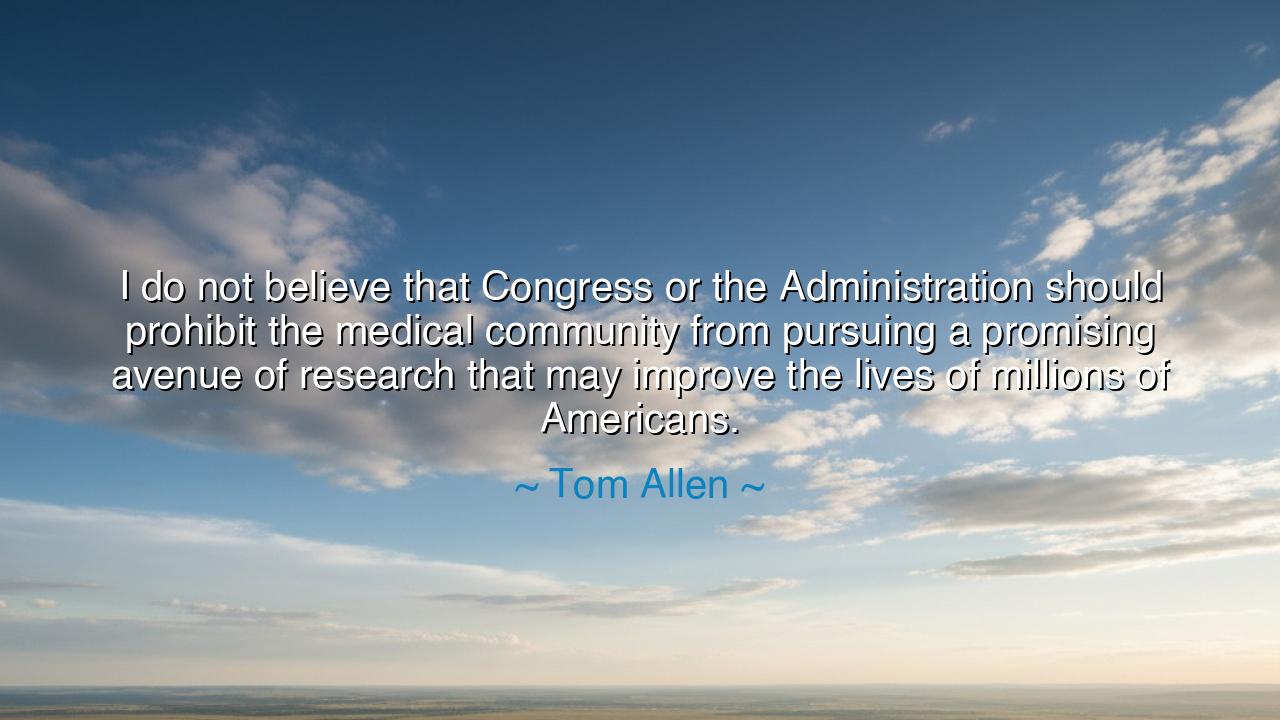
I do not believe that Congress or the Administration should
I do not believe that Congress or the Administration should prohibit the medical community from pursuing a promising avenue of research that may improve the lives of millions of Americans.






Hearken, O children of reason and seekers of healing, to the words of Tom Allen, who declared: "I do not believe that Congress or the Administration should prohibit the medical community from pursuing a promising avenue of research that may improve the lives of millions of Americans." In this proclamation lies a profound meditation on the sacred duty of science, the stewardship of knowledge, and the moral imperative to advance the well-being of humanity. Here is a call to honor curiosity, to protect the pursuit of truth, and to resist the chains of fear or bureaucracy that would stifle the torchbearers of life.
From the earliest days, men and women have gazed upon the mysteries of the body and the world, striving to uncover remedies and cures hidden within nature’s embrace. The physicians of Alexandria, who dared to dissect and study despite the reproach of custom, exemplified the principle Allen extols: that progress in medicine depends upon the courage to explore, the humility to learn, and the conviction that the welfare of many outweighs the comfort of inaction. To halt such inquiry is to deny the future, to silence the hope of countless souls waiting for relief.
Consider the tale of Dr. Jonas Salk, who in the shadow of polio epidemics devoted himself tirelessly to research. He did not seek personal glory but the salvation of thousands, pursuing avenues of knowledge that were uncertain and fraught with doubt. His vaccine would eventually bring hope to millions, yet imagine if fear, regulation, or hesitation had prevailed—how many lives would have been lost? Allen’s words echo Salk’s mission: that promising research, though imperfect, must be allowed to flourish when the stakes are the health and dignity of humankind.
Yet this is not merely a matter of medicine; it is a moral question. To prohibit inquiry is to assert that the unknown is forbidden, that potential must yield to caution. Allen challenges us to see that science is a sacred endeavor, a dialogue between the mind and nature, and that the fruits of its labor are measured not in power or profit but in the lives saved, the suffering eased, and the knowledge bequeathed to future generations. The ancients knew well that those who fear progress often condemn their own children to the shadows of ignorance.
We must also remember the cautionary example of the delay in HIV/AIDS research in the early 1980s, when stigma, politics, and fear slowed the pursuit of treatments. Lives hung in the balance, and the world learned, painfully, that obstruction in the face of promising research carries a moral cost. Allen’s insistence that Congress or the Administration should not prohibit scientific inquiry is thus both a plea and a warning: to deny researchers the tools and freedom to explore is to deny society the hope of relief, cure, and advancement.
The lesson here is clear and timeless: the path of discovery is rarely straight, and the fruits of medical research often lie hidden in uncertainty. Yet courage, diligence, and moral clarity illuminate the way. In our own lives, when faced with barriers—be they skepticism, fear, or bureaucratic hesitation—we are called to advocate for truth, to support those who labor in the service of knowledge, and to recognize that the pursuit of understanding is inseparable from the pursuit of human welfare.
Practical action emerges from this wisdom: champion the freedom of inquiry, respect the labor of those who dedicate their minds to healing, and engage with science not as passive observers, but as participants in the moral responsibility it entails. Support research, nurture innovation, and defend the pursuit of knowledge from the forces that would suppress it. In doing so, you become a guardian of hope, a witness to the power of human curiosity harnessed for the greater good.
O seeker of understanding, remember this: to restrict the pursuit of promising research is to dim the light of potential and to withhold the gift of life. Let your conscience align with courage, let your voice champion inquiry, and let your actions honor the eternal truth that the advancement of knowledge and the improvement of human lives are among the highest callings of mankind. In this, the wisdom of Tom Allen becomes a beacon, guiding us toward a future where curiosity, compassion, and courage walk hand in hand.
I can also craft a narrative version optimized for oral storytelling, with dramatic pauses and rises in rhythm to make this lesson more immersive, like an ancient moral exhortation. Do you want me to do that?






AAdministratorAdministrator
Welcome, honored guests. Please leave a comment, we will respond soon